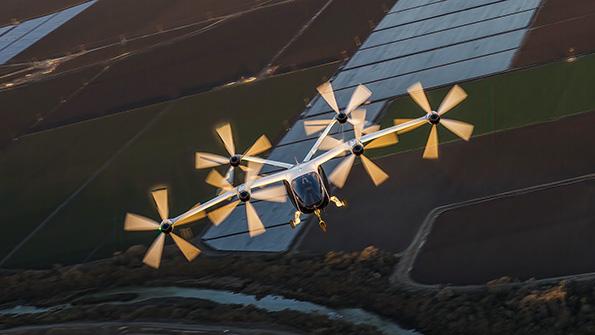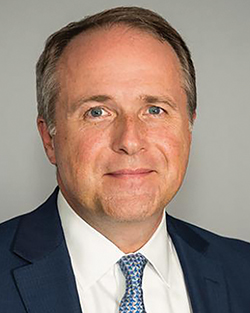
John Laughter, Delta Air Lines’ executive vice president and chief of operations, oversees safety, security and compliance; crew resources; flight operations; subsidiary airlines; and technical operations, among other items. He spoke with Aviation Week Executive Editor Lee Ann Shay about operations.
Delta invested in Joby Aviation to launch advanced air mobility operations. How’s it going to work? We invested in Joby because we think the technology is interesting and it’s further along than some others. We think it’s going to provide a lot of air mobility access to people in cities and around airports. And thinking about sustainability, as we understand more about alternative propulsion systems, this is an important step.

Do you have any concerns about the ability to supply enough electric energy? We’ve been investing in infrastructure at airports to electrify our ground service equipment. Over the next several years, we will make sure that we’re as close to 100% ground-electric as we can be. With that has come significant investment in airports—not just by Delta, but by the airports and our partnership with local governments to make sure that we can support all of those electric vehicles. Our Salt Lake City hub is close to 100% already.
Delta TechOps has opened new Pratt & Whitney Geared Turbofan and Rolls-Royce engine shops recently. Are you planning any changes in the TechOps business and how it fits in with Delta over the next few years? It’s poised for growth. Once we saw the path through the pandemic and knew we were in a position to get to the other side, we really put the pedal down and continued to advance these partnerships at the airline and MRO level. What you’ve seen us do the last few years is really get into the next-generation platforms with all three major engine OEMs, with the most recent being the CFM International Leap engine. We started the process of ordering tooling and equipment to enable us to get into that business. It’s exciting to see in my career a complete cycle of technology and see us sitting at the forefront of what’s going to be powering aircraft for the foreseeable future. As for strategy changes, we continue to refine it. Our expertise is in many things, but we have a high-tech, high-skilled workforce—both on the floor executing as well as engineers. Our place primarily is to continue to advance engines and components in repair and overhaul and find where we can add value.
Delta is investing $1 billion to offer free Wi-Fi to SkyMiles loyalty program members, with plans for it to be available on all its domestic flights by year-end and on all international and regional flights by the end of 2024. How’s the Viasat system installation progressing? The TechOps team has done a masterful job in the design, installation and certification. Every unique aircraft requires a unique certification. Every one of those supplemental type certificate projects is complex. I just have to give it to that team—the engineers, technicians and every support person who’s part of it. They have really delivered on what has been a tight schedule across multiple platforms. From a technical standpoint, too, we have to learn to maintain the system. And we’ve maintained similar systems, but not this system. We’re very pleased with the way the system is initialized for our customers and the system’s reliability.
Delta had about 30 engines in work in progress due to supply chain problems when I visited the engine shop. When do you think those issues will be solved? 2025? I can’t give you a specific date. We need to flow material at high velocity, and that’s what we do. Delta TechOps takes ownership of material ourselves, which differentiates us. We have strong OEM partnerships that continue to deliver. Our [Delta Material Services] subsidiary manages used materials for us. That has been a game changer for us and continues to be, as does our repair capability. If you can save the parts, then you don’t have as much of a supply chain problem, right? In terms of supply chain, I think you’re starting to see an acceleration, and I hope it’s not all the way up to 2025 [before the issues are solved]. I’m more optimistic than that.
How are you managing the new-generation engine ramp-ups while the supply chain problems persist? At the top level, you have to know what the flying public is doing. We’ve got a much better idea of that now, and I think you’re seeing stability in the forecast. I think the OEMs would agree with me. We know what’s in front of us, and we know the path we have to navigate.
How’s the Airbus A220 working? That is a key part of our upgrade strategy and has uniquely positioned Delta to be able to better weather the pilot shortages. Between the Boeing 717 acquisition several years ago and the A220 over the last few years, that gives us the gauge that has allowed us to get out of the 50-seat aircraft.
